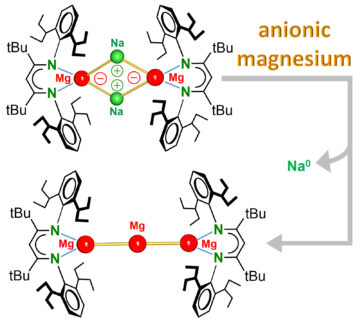Upside-down Magnesium Chemistry
Chemists at the Friedrich-Alexander-University Erlangen-Nürnberg publish a breakthrough in magnesium chemistry in the highly renowned journal Nature.
Magnesium (Mg) is an earth abundant early main group metal of low electronegativity that easily loses it’s both valence electrons. In combination with other elements it occurs naturally only in its most stable form as the positively charged Mg2+ cation. The Mg2+ cation is found in various minerals but also in chlorophyll, the pigment that makes plants green. Magnesium in the abnormal oxidation state +I was first detected in interstellar clouds but recently also first complexes with Mg+ could be isolated.
The team around Prof. Sjoerd Harder (Chair of Inorganic and Organometallic Chemistry) now discovered first Mg0 complexes in which the metal has an oxidation state of zero and formally is even negatively charged. These complexes, which contain unique magnesium-sodium bonding (Mg–Na), react completely different than common Mg2+ compounds. While electron-poor Mg2+ cations can accept electrons, the electron-rich anionic Mg0 center reacts by donating electrons.
The complex is soluble in common organic solvents and is an extremely strong reducing agent: slightly heating led to immediate reduction of the Na+ cations to Na0, a metal that normally has a strong tendency to oxidize to Na+ cations. Duringthis thermal decomposition, a new type of complex is formed in which three Mg atoms connect like beads in a chain. This Mg3 cluster reacts like atomic Mg0 and could be seen as the smallest piece of Mg metal, a piece of metal that is soluble in organic solvents. This new class of anionic Mg complexes turns Mg chemistry completely up-side down. Further unusual reactivity of this soluble, extremely strong, reducing agent can be expected.
Further information:
Link to the Nature article: https://dx.doi.org/10.1038/s41586-021-03401-w
Contact:
Prof. Dr. Sjoerd Harder, PhD
Department of Chemistry and Pharmacy
Chair of Inorganic and Organometallic Chemistry (Prof. Dr. Harder)
- Phone number: +49913185-27350
- Email: sjoerd.harder@fau.de

